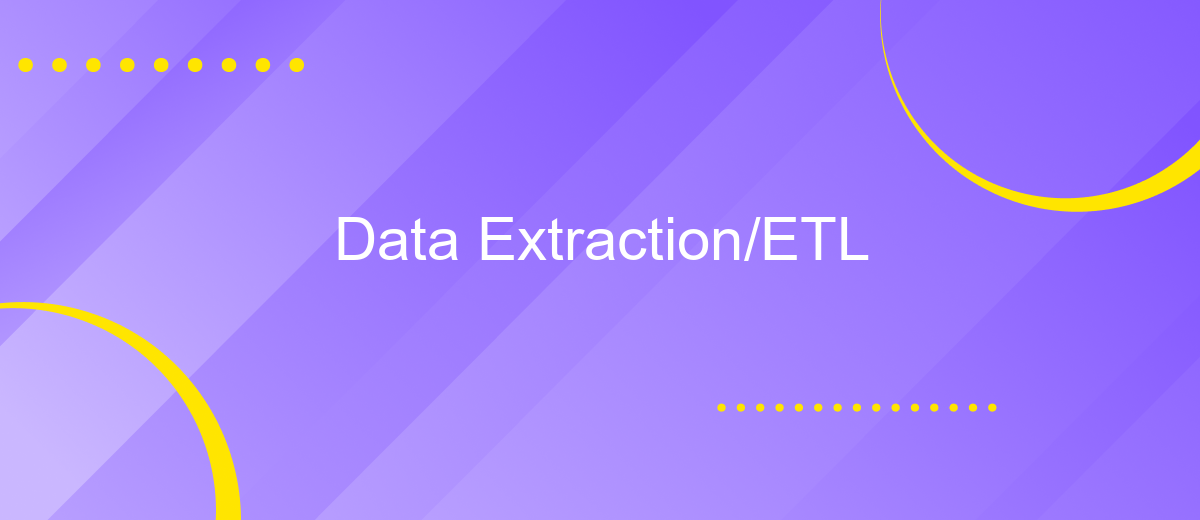Data Extraction/ETL
Data Extraction and ETL (Extract, Transform, Load) are critical processes in the realm of data management and analytics. They involve extracting data from various sources, transforming it into a suitable format, and loading it into a destination database or data warehouse. These processes ensure that data is accurate, consistent, and readily available for analysis and decision-making.
Data Extraction
Data extraction is a crucial step in the ETL (Extract, Transform, Load) process, involving the retrieval of data from various sources. This step ensures that the raw data is collected accurately and efficiently, ready for subsequent transformation and loading into the destination system. Proper data extraction is essential for maintaining data integrity and quality throughout the ETL pipeline.
- Identify data sources: databases, APIs, files, etc.
- Choose extraction methods: full extraction, incremental extraction, etc.
- Utilize tools and services: ApiX-Drive for seamless integration and automation.
- Ensure data quality and consistency: validate and clean data during extraction.
ApiX-Drive is a powerful service that simplifies the integration process by automating data extraction from various platforms. With ApiX-Drive, you can easily connect to multiple data sources, ensuring a smooth and efficient extraction process. This not only saves time but also reduces the risk of errors, making it an invaluable tool for any ETL workflow.
Data Transformation

Data transformation is a crucial step in the ETL (Extract, Transform, Load) process where raw data is converted into a format that is suitable for analysis and reporting. This involves cleaning, normalizing, and enriching the data to ensure consistency and accuracy. Techniques such as filtering out irrelevant information, aggregating data from multiple sources, and applying business rules are commonly used to achieve the desired data quality. Transformation can also include data validation and error handling to ensure that the final dataset is both reliable and useful.
Modern ETL tools and services, like ApiX-Drive, simplify the data transformation process by offering a wide range of integration options and automation features. ApiX-Drive allows users to connect various data sources and apply complex transformation rules without extensive coding knowledge. This enables businesses to streamline their data workflows and focus on deriving actionable insights. By leveraging such tools, organizations can ensure that their data transformation processes are efficient, scalable, and adaptable to changing business needs.
Data Loading

Data loading is a crucial step in the ETL (Extract, Transform, Load) process, where transformed data is loaded into the target data storage system. This step ensures that the data is available for analysis, reporting, and decision-making. An efficient data loading process can significantly impact the performance and reliability of the entire data pipeline.
- Identify the target data storage system (e.g., data warehouse, data lake, database).
- Choose the appropriate loading technique (e.g., batch loading, real-time loading).
- Ensure data integrity and consistency during the loading process.
- Monitor and optimize the performance of the data loading process.
- Utilize automation tools and services like ApiX-Drive to streamline and manage data integrations effectively.
By following these steps, organizations can ensure that their data is loaded efficiently and accurately into the target system. Services like ApiX-Drive can simplify the integration process, allowing for seamless data transfers between different systems and applications. This not only saves time but also reduces the risk of errors and inconsistencies in the data loading process.
Data Validation

Data validation is a crucial step in the ETL (Extract, Transform, Load) process, ensuring that the data extracted from various sources is accurate, complete, and reliable before it is loaded into the destination system. This step helps maintain the integrity of the data and prevents errors that can propagate through the system, leading to inaccurate insights and decisions.
During the data validation phase, several checks and balances are applied to confirm that the data meets predefined standards and business rules. These checks can include format validation, range validation, consistency checks, and uniqueness validation. Ensuring that the data conforms to these rules helps in maintaining data quality and reliability.
- Format Validation: Ensures that the data is in the correct format (e.g., date formats, numeric formats).
- Range Validation: Confirms that the data values fall within a specified range.
- Consistency Checks: Verifies that data is consistent across different datasets.
- Uniqueness Validation: Ensures that there are no duplicate records.
Integrating automated tools like ApiX-Drive can significantly streamline the data validation process. ApiX-Drive helps in setting up seamless integrations and automating data validation workflows, ensuring that data is consistently accurate and reliable before it is loaded into the target system. This not only saves time but also enhances the overall efficiency of the ETL process.
- Automate the work of an online store or landing
- Empower through integration
- Don't spend money on programmers and integrators
- Save time by automating routine tasks
Best Practices
When implementing Data Extraction and ETL processes, it is crucial to ensure data quality and consistency. Always validate and clean your data before loading it into the target system. This step helps in identifying and rectifying any discrepancies or errors in the data, ensuring that the data is accurate and reliable. Regularly monitor your ETL processes to detect any issues early and maintain the integrity of your data pipeline.
Utilizing automation tools can significantly enhance the efficiency of your ETL processes. Services like ApiX-Drive can simplify the integration between various data sources and destinations, reducing the need for manual intervention. ApiX-Drive allows you to set up automated workflows that can handle data extraction, transformation, and loading seamlessly. By leveraging such tools, you can save time, reduce errors, and ensure a smooth and consistent data flow across your systems.
FAQ
What is ETL in data extraction?
Why is ETL important for businesses?
What are the common challenges in ETL processes?
How can businesses automate their ETL processes?
What is the role of data transformation in ETL?
Apix-Drive is a simple and efficient system connector that will help you automate routine tasks and optimize business processes. You can save time and money, direct these resources to more important purposes. Test ApiX-Drive and make sure that this tool will relieve your employees and after 5 minutes of settings your business will start working faster.


